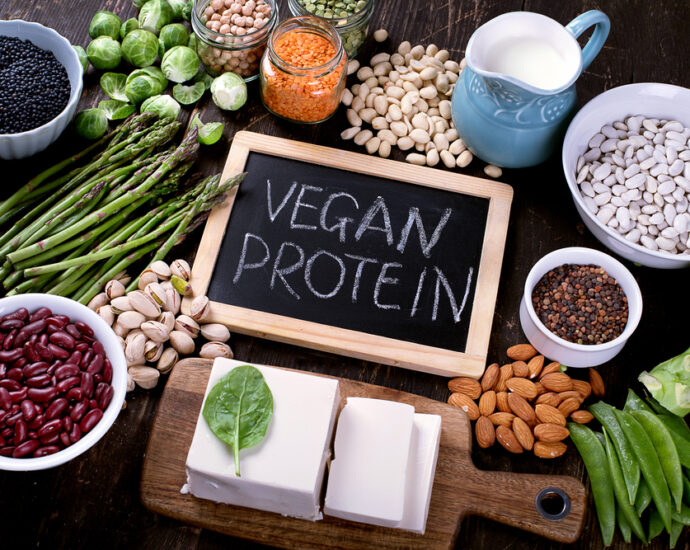Page Contents
Animal Protein
Source: Animal protein comes from animal sources such as meat, poultry, fish, eggs, and dairy products. Plant protein, on the other hand, is derived from plant sources such as legumes, nuts, seeds, grains, and certain vegetables.
Amino Acid Profile: Proteins are made up of different combinations of amino acids. Animal proteins are considered complete proteins because they contain all the essential amino acids that the body cannot produce on its own. Plant proteins, with a few exceptions like quinoa and soy, are generally incomplete proteins as they lack one or more essential amino acids. However, by consuming a variety of plant-based protein sources, it is possible to obtain all the essential amino acids.
Digestibility: Animal proteins are typically more easily digested and absorbed by the body compared to plant proteins. This is because the amino acid composition and structure of animal proteins are closer to that of human proteins. Plant proteins can be slightly less digestible due to the presence of certain anti-nutrients like phytates and enzyme inhibitors, although cooking, soaking, or fermenting plant proteins can enhance their digestibility.
Fat Content: Animal proteins often contain higher amounts of saturated fat compared to plant proteins. For example, fatty cuts of meat or full-fat dairy products are higher in saturated fats, which can have implications for heart health. Plant proteins, on the other hand, are generally lower in saturated fats and can be a healthier choice for individuals concerned about cardiovascular health.
Plant Protein
Fiber and Nutrients: Plant proteins are typically accompanied by dietary fiber, which is absent or limited in animal proteins. Additionally, plant proteins can provide various essential nutrients such as vitamins, minerals, and phytochemicals that may not be as abundant in animal proteins.
Environmental Impact: From an environmental standpoint, plant proteins tend to have a lower carbon footprint compared to animal proteins. Animal agriculture, particularly large-scale meat production, is associated with higher greenhouse gas emissions, land use, and water consumption. Plant-based protein sources can be more sustainable and have a lower environmental impact.
Protein plays a critical role!
Protein is necessary for the body because it plays a critical role in various biological processes and is essential for overall health and well-being. Here are some reasons why protein is necessary:
- Building blocks: Proteins are composed of amino acids, which are often referred to as the building blocks of life. When we consume protein-rich foods, our body breaks them down into amino acids and uses them to build and repair tissues, such as muscles, organs, skin, hair, and nails. These amino acids are essential for growth, development, and maintenance of body structures.
- Enzymes and hormones: Many enzymes and hormones in the body are made up of proteins. Enzymes are catalysts that facilitate chemical reactions necessary for digestion, metabolism, and other physiological processes. Hormones are chemical messengers that regulate various bodily functions, including growth, metabolism, and reproduction. Without proteins, these crucial regulatory processes would be impaired.
- Immune function: Proteins play a vital role in maintaining a healthy immune system. Antibodies, which are specialized proteins, help identify and neutralize foreign substances like bacteria, viruses, and toxins, thereby protecting the body against infections and diseases. Additionally, certain proteins like cytokines regulate the immune response by facilitating communication between cells.
- Transport and storage: Proteins are involved in the transport and storage of essential molecules throughout the body. For example, hemoglobin is a protein found in red blood cells that transports oxygen from the lungs to tissues. Similarly, proteins in cell membranes facilitate the movement of nutrients and ions across the cell and regulate the entry and exit of substances.
- Energy source: While carbohydrates and fats are the body’s primary energy sources, proteins can also provide energy when needed. In the absence of sufficient carbohydrates and fats, the body can break down proteins and convert them into glucose through a process called gluconeogenesis.
It is important to note that the body requires a regular intake of dietary protein since it cannot store excess protein for future use like it can with carbohydrates and fats. Adequate protein consumption is particularly important during periods of growth, such as childhood and adolescence, as well as during pregnancy, lactation, and recovery from injuries or illnesses. The recommended protein intake varies depending on factors such as age, sex, activity level, and overall health.
Takeaway
It’s important to note that the choice between plant protein and animal protein is a personal one and depends on individual dietary needs, preferences, and ethical considerations. A well-balanced diet can be achieved with either source of protein, and it’s beneficial to include a variety of protein sources in your diet to ensure you meet your nutritional requirements.
Sources:
https://www.ncbi.nlm.nih.gov/pmc/articles/PMC5872778/
https://medlineplus.gov/genetics/understanding/howgeneswork/protein/
https://healthsurgeon.com/purium/puriums-plant-based-protein-options/
